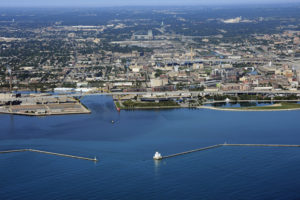A modified RCL soil spreadsheet has been developed to assess seven carcinogenic polycyclic aromatic hydrocarbons (cPAHs) on a cumulative basis. Using this modified spreadsheet is considered a risk assessment and may be used to determine alternate environmental standards when attaining compliance with the non-industrial RCLs is not practicable. Pre-approval by the DNR of a risk assessment proposal is required before conducting and developing the risk-based standard (e.g. by using the modified RCL spreadsheet). A second DNR approval is required to use the risk-based standards as the soil RCLs. Under the PECFA program, costs for cPAH analysis will be approved as a variance at the Staff Professional hourly rate (a reasonable amount of hours depending on the amount of data), with up to two hours of Consultant Project Manager time to review and make conclusions.
Requests to use the risk-assessment approach and alternative risk-based standards for cPAH can be:
- Included with any other fee-based request (with no additional fee required for the cPAH calculation) submitted during the investigation or remediation phase of the project; or
- As a separate technical assistance request with fee ($700).
It is also possible for the requests for DNR approval to be included with the closure request. In that instance, standard closure fees will apply.
For more information on the risk assessment approach or using the modified RCL spreadsheet, see:
Calculating Soil RCLs for PAHs Wis. Admin. Code § NR 722.11 (1) (RR-087)
Building Demolition
Building demolition will only be reimbursed if the DNR determines that it is necessary in order to complete response actions for PECFA-eligible contamination. Costs for building demolition must be approved in advance by the DNR through a variance.
Eligible activities related to building demolition include:
• costs for consultant and subcontractors to meet pre-demolition to agree upon plan of action;
• demolition contractor costs;
• asbestos and other hazardous material inspection costs;
• abatement of asbestos/hazardous materials;
• mobilization and hourly rate for waste haulers;
• actual landfill rates; and
• actual cost of landfill environmental fee.
(Please note: DNR Project Managers have the discretion to ask for bids to obtain reasonable costs.)
Ineligible activities related to building demolition include:
• DNR fees;
• costs for consultant oversight of the demo;
• costs for consultant oversight of the asbestos or other hazardous waste abatement by certified subcontractors;
• cost to remove or haul personal property or to oversee the removal of personal property; and
• site restoration.
(Please note: Other activities may be deemed ineligible at the discretion of the DNR Project Manager.)
As the PECFA program nears the June 2020 deadline, new issues regularly come up as consultants work to close sites. The Remediation and Redevelopment Program will address these issues, providing direction and consistency in managing them. Questions about PECFA or related issues may be addressed to mailto:Jenna.Soyer@wisconsin.gov or at 608-267-2465.

